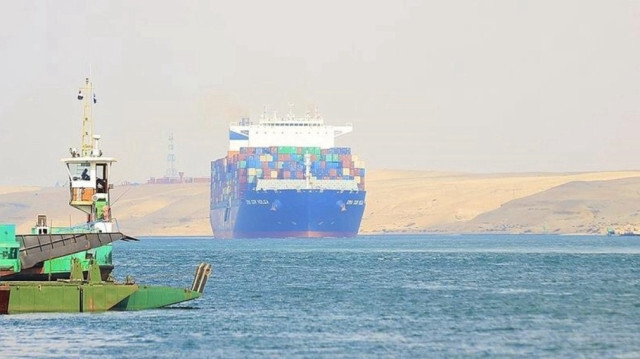
Ship transits through Cape of Good Hope up by 27% in week of December 25-31
Ship traffic in the Red Sea decreased by 20% in December 2023, as shipping companies suspended their operations or shifted their routes to the Cape of Good Hope after the Houthi rebels in Yemen attacked commercial vessels in the Red Sea related to Israel-Hamas conflicts.
Yemen's Iranian-backed Houthi rebel group, officially known as Ansar Allah, has significantly stepped up its involvement in the conflict in the Gaza Strip.
The group has warned it will attack all Israeli-bound ships in the Red Sea -- one of the world's most frequently used sea routes for oil and fuel shipments -- in a bid to support Palestinians as they face Israel's aggression and siege in Gaza.
Several of the world's largest container companies have suspended operations in the region.
According to data obtained by Anadolu from MarineTraffic, a ship tracking and maritime analytics provider, following the Houthi attacks, ship traffic decreased noticeably, especially in the second half of December 2023, as many shipping companies decided to stop their operations there.
The most influential factor in the decline in traffic in the Red Sea was that container ships stopped transiting the Red Sea and turned their routes to the Cape of Good Hope.
According to MarineTraffic data, the number of container ships passing through the Red Sea in December 2023 decreased by 25% compared to the number of ships in December 2022.
In this period, the number of ro-ro vessels passing through the Red Sea also decreased by 25%, while there was no significant change in the number of liquefied natural gas, LPG, and dry cargo vessels.
Following the attacks in the Babu'l Mendep Strait in the Red Sea, the Danish shipping company Maersk, the world's largest container company, the Italian-Swiss Mediterranean Shipping Company (MSC), the German shipping company Hapag-Lloyd, the French shipping company CMA CGM and the British energy company BP decided to suspend their operations in the region.
Following these companies' decisions, daily ship traffic in the Red Sea decreased by 20% in the second half of December 2023 compared to the first half of the month.
Ship traffic in the Red Sea declined rapidly as of December 16, 2023.
While the number of ships traveling in the Red Sea was 646 on December 1, this number increased to 681 on December 16 and dropped to 521 on December 31.
- Crossings through the Cape of Good Hope up 27%
Following the redirection of container ships' transits in the Red Sea to the Cape of Good Hope, ship transits through the Cape of Good Hope increased by 27% in the week of December 25-31 compared to the previous week.
Container ships account for 40% of all arrivals to Israel by sea from abroad by volume, while the number of container ships docking in the country decreased by 11% and 16% year-on-year in November and December 2023, respectively.
Taiwanese container shipping company Evergreen and Hong Kong-based OOCL suspended deliveries to Israeli ports while Maersk and MSC resumed.
Maersk announced on January 5, after one of its ships was attacked by the Houthis, that it had decided to divert all of its ships transiting the Red Sea/Gulf of Aden from around the Cape of Good Hope to the south in the near future.
Ioannis Papadimitriou, senior freight analyst at data analytics company Vortexa, told an Anadolu correspondent that the number of international trade tankers passing through the Babu'l Mendep Strait has dropped by more than 15% in the second half of December 2023 compared to the first half.
Papadimitriou said that transits through the Suez Canal and the Babu'l Mendep Strait were higher in December 2023 compared to the same month last year and this is normal due to the change in trade routes after the embargo imposed by the European Union and G7 countries on Russian oil.
However, he noted a slight decrease was seen in vessel traffic in the first half and second half of December 2023.
- 12% of global trade passes through the Suez Canal
Approximately 12% of global trade passes through the Suez Canal, with more than 50 ships crossing the canal every day, carrying around $10 billion worth of goods to Northern Europe, the Mediterranean and the east coast of North America.
For 154 years, the Suez Canal has offered the shortest route between Europe and Asia, connecting the Mediterranean to the Red Sea.
The Babu'l Mendep Strait, which formed part of the connection between the Mediterranean and East Asia with the construction of the Suez Canal in northern Egypt, is particularly critical for the supply of oil transported by sea.
The Babu'l Mendep Strait accounts for 10% of the world's supply of crude oil and petroleum products transported by sea.
Redirecting the route of the ships to the Cape of Good Hope in southern Africa means an increase in travel time by 10-14 days and 4,000 nautical miles (6,500 kilometers).
Such a longer operation costs around $1 million in extra fuel costs, while insurance costs and delivery time also increase.
Hello, the comments you share on our site are a valuable resource for other users. Please respect other users and different opinions. Do not use rude, offensive, derogatory, or discriminatory language.
The floor is all yours.








